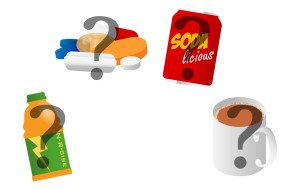Energy Myths
 Everyone is talking about energy these days — where we get it, how we use it, etc. Let’s take some time to delve into the world of energy, starting with these common energy myths.Myth #1: Vitamins boost energy levels.The Truth: Vitamins participate in the chemical processes that release energy from food during digestion, but they don’t supply energy on their own. If you skip a meal and instead take vitamins and minerals, your energy levels and reserves will plummet later in the day.Myth #2: You need sugar to avoid a late-afternoon energy slump.The Truth: The sugar found in sweetened beverages, cookies, candy, cakes, and baked goods provides a quick source of energy that spikes blood sugar levels, but leaves us feeling tired and drained as our blood sugar drops. Instead of sweet, quickly-digested snack foods, reach for foods that take longer to digest and provide a steady and even source of energy, along with plenty of vitamins and minerals. Try…
Everyone is talking about energy these days — where we get it, how we use it, etc. Let’s take some time to delve into the world of energy, starting with these common energy myths.Myth #1: Vitamins boost energy levels.The Truth: Vitamins participate in the chemical processes that release energy from food during digestion, but they don’t supply energy on their own. If you skip a meal and instead take vitamins and minerals, your energy levels and reserves will plummet later in the day.Myth #2: You need sugar to avoid a late-afternoon energy slump.The Truth: The sugar found in sweetened beverages, cookies, candy, cakes, and baked goods provides a quick source of energy that spikes blood sugar levels, but leaves us feeling tired and drained as our blood sugar drops. Instead of sweet, quickly-digested snack foods, reach for foods that take longer to digest and provide a steady and even source of energy, along with plenty of vitamins and minerals. Try…
- Whole grain crackers
- Fruit
- Plain yogurt
- High-fiber cereal
Include a small amount of protein from nuts, cottage cheese, or hummus and you’ll feel satisfied longer.Myth #3: Coffee keeps you going even if you don’t have time for breakfast.The Truth: Caffeine gives us a false sense of energy, and the sugar and cream we add to coffee provide calories without essential nutrients. Research shows that skipping a balanced breakfast decreases mood and energy levels throughout the day. Don’t let coffee stand in for a decent meal!Myth #4: Energy drinks provide energy.The Truth: Many energy drinks contain sugar, which provides short-lived energy. Yet we know that decreasing added sugar intake has several health benefits, including reduced risk of cardiovascular disease, type 2 diabetes, tooth decay, and obesity.Furthermore, the primary ingredient in energy drinks is caffeine (or other substances similar to caffeine) often equivalent to the amount of caffeine in 5 cups of coffee. This is more than the 400 mg threshold recommended by the FDA. The stimulants in energy drinks make us feel more alert, but don’t truly provide the type of energy that our bodies need to survive and thrive.By Lynn Grieger, RDN, CDE, CPT, CWC


